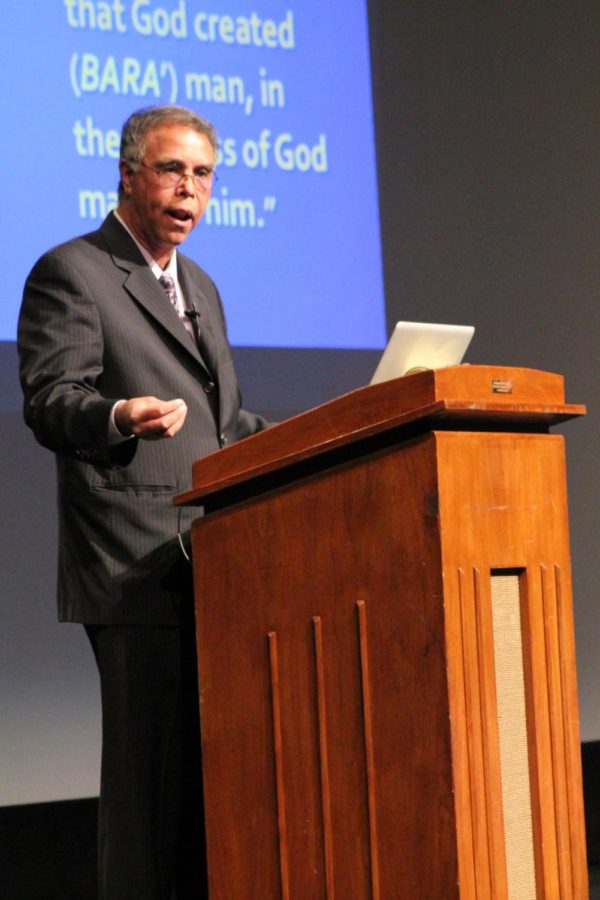ISU professor Hector Avalos debates evolutionism versus creationism
Richard Martinez / Iowa State Daily
On Sunday, Iowa State University professor of religious studies Hector Avalos and senior pastor at Iglesia Centro Evangelico in Miami, Fla., Rev. Juan Valdes, engaged in a debate in favor of evolution and creationism, respectively, at Indianola High School.
February 17, 2014
One of the most controversial, complex and thought-provoking arguments is creationism versus evolution.
Hector Avalos, an atheist ISU professor in religious studies, and Rev. Juan Valdes, a Christian senior pastor of a Spanish-speaking congregation in Florida, met on Feb. 16 at Indianola High School in Indianola, Iowa, in hopes of answering the main question of their debate: Is Genesis 1-3 a scientifically reasonable account of the origin of the world?
“Our differences are founded upon our belief, or lack of belief, in God, and therefore, our belief in the Bible as his word,” Valdes said.
Valdes began the debate by speaking to his supporters and saying he hoped to pursuade those on the fence to believe in God.
Valdes defined science as “a conflict between competing alternatives and explanations of events that fall outside of observable science.” He also clarified that he was not describing the Bible as a scientific textbook.
“As long as scientific evidence provides a rational basis that warrants drawing out the conclusion, the hypothesis is scientifically plausible,” Valdes said.
The main arguments Valdes made in his opening questioned the evolutionists’ approach to how things came about on Earth. Valdes said the miracle of life and the design of the human body could not be the product of random choice.
“To look at our universe and say that it’s all the process of unguided, undirected, mindless, random events — I find that very hard to believe,” Valdes said.
Avalos then presented his views, starting with his own definition of science as “the systematic attempt to understand the universe through evidence derived from one or more of the five natural senses and/or logic … the assumption that only natural causes should be used in explaining natural phenomena, also is an essential part of modern science.”
Avalos’ main points were that there are many versions and languages of the Bible and that creationists ignore or minimize other cultures and their versions of how the universe began.
Avalos’ preferred rendition of the Bible is Hebrew. It translates to “When Elohim began to shape the heavens and the earth…,” said Avalos, not to “When God created out of nothing the Heaven and the Earth.” He then said the Hebrew word ‘bara’, or ‘create,’ did not necessarily mean to create out of nothing.
Other details that supported Avalos’ view were areolas, or nipples, on men when Genesis 2:23 (Revised Standard Version) said, “…she shall be called Woman because she was taken out of Man,” and that scientific evidence did not support that dinosaurs coexisted with human beings, like creationists might suggest.
In response to Avalos’ remarks on different Bible renditions, Valdes said, “Those biblical scholars, those teams of translators for each of those Bibles, translate the Bible as “In the beginning, God created the heavens and the earth.” And they mean beginning as in beginning, and if God created the heavens and the earth, I’m not sure what was there before.”
Valdes also, to support his views, talked about hemoglobin reportedly found in dinosaur fossil records, which would support his belief that dinosaurs were more recent and able to coexist with humans. He also talked about his thoughts on whale evolution.
“Whale evolution says that a wolf-like animal went back into the ocean and evolved into a blue whale,” Valdes said. “Really? We believe that a land-dwelling animal went back into the ocean?”
In response to the hemoglobin in fossils, Avalos said those examples were hemoglobin breakdown products and not living red blood cells.
“Things can look like a blood vessel, but you can’t confirm it until you’ve confirmed it chemically,” Avalos said.
Valdes remained firm with his belief that organic material found in dinosaur fossils could not last 65 million years and not decay.
He also addressed Avalos’ comment on male nipples.
“Medical doctors will tell you that the human anatomy has to have the mammary glands, both male and female,” Valdes said. “In development, hormones kick in and activate the mammary glands in women and don’t in men.”
In Avalos’ final rebuttal, he brought up the concept of preservation and dinosaurs.
“For a thousand years or more, Christians who said that they have believed their Bible thought God would preserve everything he had created on the basis of texts like Nehemiah 9:6 that says, ‘Thou preserves all of them,’” Avalos said.
In closing, Valdes spoke to the young people in the audience and restated his position that God created everything.
“I presented evidence to you that was irrevocable and irrefutable,” he said. “If you were on the fence, I hope it made a difference.”
Avalos’ closing was also geared toward young people and his belief in science.
“Science’s track record is superb,” Avalos said. “It has found natural causes for phenomena that was thought to be supernatural.”







